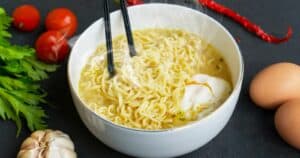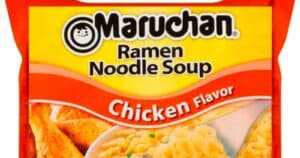Ramen noodle fans have strong opinions about which instant noodles pack the most addictive burn. Two top contenders are Korean and American spicy noodle varieties. But when it comes to heat, do Korean or American spicy noodles reign supreme?
Exploring the Roots of Korean Spicy Noodles
Instant ramen originated in Japan but became an icon of Korean food culture. Many Korean noodle brands like Samyang Foods and Nongshim are known for ultra-spicy flavors.
The secret behind the incendiary heat? Gochujang, a Korean fermented chili paste, and gochugaru, finely ground red pepper powder. Generous amounts of these ingredients provide Korean spicy noodles with intense, layered
Other aromatics like sesame oil, garlic, and onions add depth while seaweed gives savory umami taste. The chewy, springy wheat-based noodles stand up well to fiery broths.
American Spicy Noodles Ramp Up Heat with Extracts
American brands like Maruchan and Nissin also produce spicy instant noodle lines. However, their versions rely more heavily on chili extracts versus whole Korean chili pastes and powders.
Extracts like capsaicin oleoresin provide pure punch-to-the-face heat. Other extracts add tanginess (vinegar powder) and savory flavor (yeast extract).
Thickeners like modified corn starch give American noodles a softer, less toothsome texture than Korean varieties. Artificial flavors and preservatives are common too.
Comparing Flavor Profiles and Ingredient Differences
Beyond heat level, Korean and American spicy noodles have distinct flavor profiles:
Korean Spicy Noodles
- Complex flavor from fermented chili pastes
- Nutty, robust sesame oil
- Natural sweetness from carrots, onions
- Satisfying chewiness
American Spicy Noodles
- Intense heat from extracts
- Vinegar tang and mineral taste
- Artificial flavors
- Soft, instant noodle texture
This makes Korean noodles taste more naturally savory and fermented while American noodles lean artificial and astringent.
Heat Factor – Which Noodles Bring More Fire?
When it comes to pure spiciness, most foodies give Korean noodles the edge for several reasons:
- Korean gochugaru and gochujang provide multi-dimensional heat.
- Extracts in American noodles overwhelm flavors with one-note burn.
- Some American brands add extra scoville units by coating noodles in chili powder.
However, personal tolerance for capsaicin is key. Those highly sensitive may find American noodles too scorching while Korean noodles offer a more balanced, flavored heat.
The Verdict? Taste is Subjective But Both Deliver Delicious Heat
Determining definitively whether Korean or American spicy noodles are spicier ultimately depends on personal preference.
Some may enjoy the tongue-tingling, slightly numbing quality of Korean noodle heat. Others crave the intense chili burn of American versions.
When you need a mouth-watering kick, sampling different spicy noodle brands is the best way to decide which style satisfies your heat-seeking taste buds.
Just be sure to have plenty of water handy for when the
FAQs
1. What makes gochujang different from regular chili paste?
Gochujang is a fermented Korean condiment that uses sticky rice, chili peppers, and soybeans for added sweetness and complex umami flavor.
2. Do American spicy noodles contain any actual chilis?
Some do add chili powder for extra heat, but many rely solely on chili extracts like capsaicin oleoresin to provide spiciness.
3. Which Korean spicy noodle brand is the hottest?
Samyang’s 2x Spicy Hot Chicken Flavor Ramen is notoriously fiery with a Scoville rating over 8,000 units.
4. What’s the difference between chili powder and chili flakes?
Chili powder is made from ground dried peppers. Flakes are small pieces of crushed dried peppers with seeds.
5. Should you drain the noodle water or drink it?
That’s a personal choice! Draining removes some starchiness but the broth contains lots of spicy flavor compounds.
Let me know if you need any other FAQs covered or have additional questions to address!





